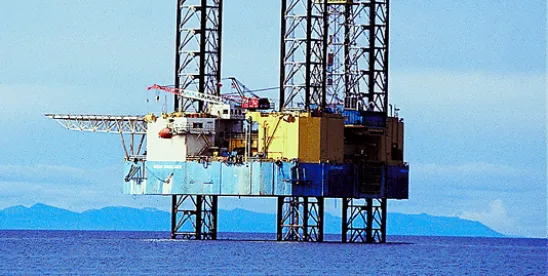The Bureau of Ocean Energy Management (BOEM) announced its finalization of a rule substantially revising the financial assurance requirements applicable to offshore oil and gas operations. The final rule revises criteria for determining whether oil, gas, and sulfur lessees, right-of-use and easement (RUE) grant holders, and pipeline right-of-way (ROW) grant holders are required to provide supplemental financial assurance above the current minimum base bond levels. The final rule also codifies the federal government’s process for estimating decommissioning costs; clarifies bonding requirements for RUE and ROW grant holders; and removes restrictions on the use of third-party guarantees to fulfill financial assurance obligations. BOEM estimates that a total of $6.9 billion in new supplemental financial assurance will be required as a result of the final rule, down from $9.2 billion estimated in the proposed rule.
BOEM’s final rule marks the federal government’s latest attempt to ensure operators possess adequate financial assurance to cover the decommissioning of oil and gas assets on the Outer Continental Shelf (OCS). BOEM states that the final rule is intended to ensure “the protection of the American taxpayers from exposure to financial loss associated with OCS development, while ensuring that the financial assurance program does not detrimentally affect offshore investment or position American offshore exploration and production at a competitive disadvantage.” The final rule will become effective 60 days after its publication in the Federal Register and compliance will be phased-in over the course of three years.
The History of BOEM’s Financial Assurance Regulations
BOEM’s final rule is the latest development in a multi-year effort to overhaul the agency’s financial assurance regulatory framework. BOEM’s current financial assurance regulations consists of two main parts: (1) base bonds, generally required in amounts prescribed in the regulations; and (2) supplemental financial assurance, which is an amount above the base bond that is required at the agency’s discretion to ensure a lessee or grant holder can fulfill its contractual and regulatory obligations. Under the current regulations, BOEM considers five criteria to assess whether a lessee or grant holder is required to obtain supplemental financial assurance: (1) financial capacity; (2) projected financial strength; (3) business stability; (4) reliability in meeting obligations based upon credit rating or trade references; and (5) record of compliance with laws, regulations, and lease terms. Additionally, BOEM provides further guidance on how it analyzes the five criteria through its issuance of Notices to Lessees (NTLs). Historically, BOEM has waived supplemental financial assurance for many lessees and grant holders.
From 2015 to 2020, in the wake of several major oil and gas bankruptcies, BOEM and its sister agency, the Bureau of Safety and Environmental Enforcement (BSEE), issued NTLs and proposed rules aimed at remedying what the agencies viewed as a significant problem: the federal government’s estimated decommissioning costs greatly exceed the amount of financial assurance held by oil and gas companies operating on the OCS. BOEM estimates that it has financial assurance in place for less than 8 percent of an estimated $38.2 billion in decommissioning liabilities. In its most recent proposed rule issued in June 2023, BOEM proposed significant revisions to its financial assurance regulations to address these risks.
BOEM’s 2024 Final Rule
The final rule, announced on April 15, 2024, is largely consistent with the agency’s June 2023 proposed rule. Significant regulatory revisions resulting from the final rule include:
- New Criteria for Supplemental Bonding: Under the final rule, BOEM will consider a new set of criteria to determine whether OCS lessees and grant holders are required to obtain supplemental financial assurance. BOEM will consider (1) credit rating; and (2) valuations of proved oil reserves. BOEM will accept two forms of credit ratings: (1) a credit rating from an NRSRO; or (2) a proxy credit rating that BOEM determines based on a company’s audited financial statements. To determine proxy credit ratings, BOEM will use S&P Global’s Credit Analytics credit model, but reserves the right to use a different model if it believes that model will more accurately reflect the true credit rating. As a threshold, BOEM will not require a company to secure supplemental financial assurance if it has an investment grade credit rating (i.e., a credit rating from an NRSRO that is greater than or equal to either BBB- from S&P or Baa3 from Moody’s, or the equivalent from another NRSRO). BOEM can also consider the value of proved oil and gas reserves per lease. Using BSEE’s cost estimates, if BOEM determines that the value of the reserves on any given lease exceeds three times the cost of the decommissioning estimate associated with the production of those reserves, then BOEM will not require that company to secure supplemental financial assurance.
- New Process for Estimating Decommissioning Costs: BOEM finalized its proposal to use BSEE’s P70 decommissioning cost estimate to determine whether supplemental financial assurance is needed. BOEM’s probabilistic P70 estimate is the value that BSEE determines to have a 70 percent chance of recovering the full decommissioning cost. In BOEM’s view, “a supplemental financial assurance set based on the P70 value means that, based on the uncertainty and risk applied by BSEE to its model, there is a 70% probability of covering the decommissioning cost of the facility (and therefore a 30% probability of exceeding it).” BSEE’s probabilistic decommissioning cost estimates are based off of actual expenditure data collected from oil and gas companies since April 2016 for wells and facilities, and since May 2017 for pipelines.
- Consideration of Co-Lessees: BOEM will not require supplemental financial assurance for leases where at least one co-lessee meets the credit rating threshold. BOEM recognizes that “all current owners are benefiting from ongoing operations and are jointly and severally liable for compliance with DOI requirements.”
- Changes in Bonding Requirements for ROW and RUE Grant Holders: To evaluate whether ROW or RUE grant holders are required to obtain supplemental financial assurance, BOEM will only consider the grant holder’s credit rating, as ROW and RUE grants do not entitle the holder to any interest in oil and gas reserves. For RUE grant holders, they will now be required to provide base financial assurance of $500,000, regardless of whether the RUE serves a state lease or a federal OCS lease. An RUE grant-holder may now be required to provide supplemental financial assurance if they do not maintain an investment grade issuer credit rating or proxy credit rating equivalent.
- Third-Party Guarantees: The final rule allows lessees and grant holders to use third-party guarantees for supplemental bonding purposes. It also removes the requirement that a third-party guarantee must ensure compliance with the obligations of all lessees, operating rights owners, and operators on the lease. The amendments allow a guarantee limited to a specific amount or limited one or more specific lease obligations, subject to BOEM’s agreement.
- Impacts of Assignments or Transfers of Leases: BOEM may withhold approval of any new transfer or assignment of any lease interest unless and until financial assurance demands have been satisfied. This revision could impact oil and gas transactions and restructurings.
- Timing of Compliance: The final rule will become effective 60 days after its publication in the Federal Register, butBOEM will phase in compliance over a three-year period. BOEM will initially require a company that receives a supplemental financial assurance demand to provide one-third of the total amount by the deadline listed on the demand letter. BOEM would then require a second one-third within 24 months of the receipt of the demand letter, and the final one-third payment within 36 months of the receipt of the demand letter. BOEM states that the “compliance window” will end on the date three years after the effective date of the final rule, and any party receiving a supplemental financial assurance demand after that date will be required to provide the supplemental financial assurance in full as required by the demand, with no phase-in. BOEM acknowledged in the final rule that it maintains the general practice of evaluating lessees, RUE grant holders, and pipeline ROW grant holders for financial risk on at least an annual basis, but that it can demand supplemental financial assurance at any time.
- Appeal Bond: The final rule also requires that any company seeking to stay a supplemental financial assurance demand pending appeal must, as a condition of obtaining a stay of the order, post an appeal bond in the amount of supplemental financial assurance required. If the appeal is unsuccessful, the appeal bond could be replaced with, or converted into, bonds or other forms of financial assurance to cover BOEM’s supplemental financial assurance demand.
BOEM’s final rule is expected to have market-wide impacts. BOEM’s regulatory amendments will likely require oil and gas operators to obtain billions of dollars in additional financial assurance. This may prove challenging for certain companies, as the US surety bond market for the sector has become less accessible in the wake of major oil and gas bankruptcies.




 />i
/>i

